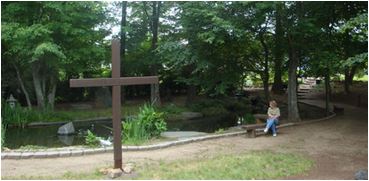
As we walked near the little pond on the 30-acre property, Foster explaining the church's environmental projects to me, another guest suddenly arrived: a great blue heron with a wing span of about five feet. As I watched the grand bird peacefully wade through the pond, I knew that St. Luke Church had truly created a marvelous wildlife habitat.
Foster, a volunteer gardener for the church, took special care to show me all the flowers, trees, water sources, bluebird houses, and the butterfly mud pond. These things were just some of many that have made St. Luke Church a certified F.A.I.T.H. site. F.A.I.T.H. stands for "Fellowship Actions Impacting the Habitat."
F.A.I.T.H. certification, done through the N.C. Wildlife Federation, is a non-denominational program that recognizes and certifies places of worship that meet requirements for a wildlife-friendly habitat. It is designed to encourage ongoing stewardship of wildlife.
060311-st-luke-environmentalism-2Foster describes the church's property as "alive with many kinds of creatures." The surrounding area consists of a creek, a man-made pond, areas of unmowed grass, two large garden areas, and an abundance of trees and shrubs. When they garden, the parishioners try to use only native plants, because these plants will bear the nectar, seeds and berries that provide food for native wildlife.
While St. Luke Church has a larger amount of property than most churches, Foster assures people, "You could technically do something like this on an apartment balcony." The four components of habitat that guide the F.A.I.T.H. certification process are: food (native plants or feeders), water (used for drinking, bathing and breeding), cover (shelter for wildlife from bad weather and predators), and places to raise young.
Cultivating an appreciation and awareness of nature is just one of many ways that churches can be good stewards of God's creation. A church is an ideal place to create wildlife habitats. As Foster says, "If you can't expect a church to support God's creation, who in the world will?"
She is happy to talk with anyone interested in creating a certified wildlife habitat either at their home or at their church. E-mail her at This email address is being protected from spambots. You need JavaScript enabled to view it.. Church members can also learn more about F.A.I.T.H. certification on the Web at http://www.ncwf.org/Habitat%20Programs/index.php.
— Christopher Lux, correspondent
Pictured above: St. Luke Church in Mint Hill has been certified by the N.C. Wildlife Federation as a "F.A.I.T.H. site," for the development of its 30-acre natural area, pond and garden which provide a habitat for native plants and wildlife. The pond is encircled by an outdoor Stations of the Cross, and the property contains many areas for people to come to pray and enjoy the tranquility of God's creation. Debbie Foster, a volunteer gardener for the church, sits near the pond amidst all the flowers, trees, bluebird houses and more. (Photo by Christopher Lux, Catholic News Herald)


